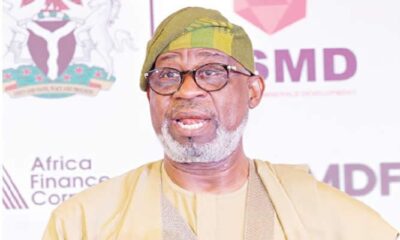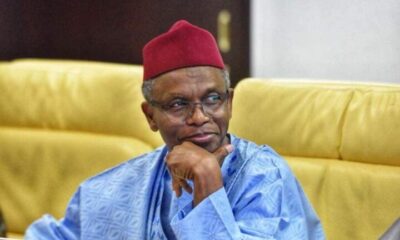The Nigerian Medical Association has conducted the court-ordered health examinations on the detained leader of the Indigenous People of Biafra, Nnamdi Kanu.
The Secretary-General of the NMA, Dr. Ben Egbo, confirmed the development in an interview with our correspondent on Sunday.
The Federal High Court in Abuja had on September 26 ordered the NMA to, within eight days, constitute a panel of medical experts to assess the health condition of Kanu.
In his ruling, Justice James Omotosho ordered the NMA President to submit the committee’s report within eight days for consideration on whether Kanu should be transferred to the National Hospital for treatment.
On Sunday, the NMA’s Secretary-General, Egbo, said the evaluation had been done as ordered by the court, adding that the report had been submitted to the Attorney General of the Federation.
Egbo said, “The court gave an order that we should do it. I think, within eight days, and immediately the Department of State Services wrote to us, we summoned a committee of seven doctors with one coordinator, making it eight.
“We had the seven doctors from the seven geopolitical zones of Nigeria with different fields of specialty in Ophthalmology, Neurology, Urology, Gastroenterology, and other various areas of specialty.
“They went there, examined him (Kanu), and the committee wrote their report to us, and it was sent to the Attorney General of the Federation.”
The judge’s ruling followed an application by Kanu to be moved from the custody of the Department of State Services to the National Hospital, over what he described as his failing health.
The judge directed that the committee, among other tasks, should assess the DSS hospital to confirm whether it has the capacity to meet Kanu’s health needs.
Justice Omotosho further ruled that the NMA committee would be at liberty to make use of any hospital in the country for its investigations.
The General-Secretary emphasised that any further inquiries be directed to the Ministry of Justice.
“We have submitted the report to the Attorney General’s office as instructed. Anyone seeking details should contact the Ministry of Justice,” he added.
Meanwhile, Kanu, through his legal team, has petitioned the World Medical Association over what he described as serious health challenges and inadequate medical care while in the custody of the Department of State Services.
In a letter dated October 3, 2025, and signed by Kanu’s international counsel, Bruce Fein, on his behalf, and addressed to the WMA President, Dr. Jacqueline Kitulu, Kanu claimed that his health condition had deteriorated due to insufficient medical attention in detention.
He stated that he “has been detained in a Nigerian facility in solitary confinement for more than four years without a trial. He was arrested in Nairobi, Kenya, in June 2021.”
The letter, which was copied to the Registrar of the Federal High Court, Abuja; the Department of State Services; the Medical and Dental Council of Nigeria; and the Nigerian Medical Association, said the situation had reached “a life-threatening threshold.”
It appealed to the WMA to engage with the NMA to ensure that Kanu receives “the highest professional standard of medical care” and that “his medical providers are allowed to work without intimidation or interference.”
Kanu also requested the WMA, directly or through the NMA, to review what he described as irregularities in his medical records while in DSS custody.
The letter further sought protection for independent medical practitioners “from any possible retaliation for providing medical care to Mazi Nnamdi Kanu.”
He demanded the release of the NMA medical team’s report of September 22, 2025, which the Federal High Court had directed to be filed within four days.
He warned that any delay could create “the real danger that a replacement panel may be assembled, thereby undermining the medical truth.”
According to the letter, Kanu’s health challenges reportedly began after his detention in Nairobi in June 2021.
“On arriving at Jomo Kenyatta International Airport in Nairobi, MNK was taken into custody by masked operatives and held for eight days in a confined room,” he wrote in the letter.
He said he was allegedly denied food, water, and prescribed medications for the first five days, leading to breathing difficulties and weakness.
“On the fifth day, when his body began to fail, a doctor was summoned. His blood pressure was dangerously high. MNK was given a 40mg dose of Amlodipine along with a red-coloured liquid,” the letter stated.
Kanu said his treatment in Kenya left him “physically weakened” by the time of his transfer to Nigeria.
In the DSS facility in Abuja, blood analysis allegedly revealed “a critical potassium deficiency,” prompting a series of medical prescriptions that reportedly failed to stabilize his condition.
“Whenever potassium supplements were withdrawn, MNK’s levels dropped again to the same life-threatening range,” he claimed, adding that a South African laboratory confirmed the deficiency.
He further alleged inconsistencies in his medical test results under one of the physicians assigned to him in custody.
“From the moment he assumed control, the doctor began recording normal potassium levels when in reality they were low,” he wrote.
Under what he described as inadequate care, Kanu reportedly continued to experience nosebleeds, fainting spells, chest pains, headaches, and swelling of the feet.
“Over 50 blood samples have been taken during MNK’s time in DSS custody, but these have yielded no improvement in his health under the management of the assigned doctors,” the letter stated.
He praised Emeritus Professor Martin Aghaji, a respected surgeon, for stabilising his condition when he was eventually allowed to intervene.
“It is no exaggeration to say that without Emeritus Professor Martin Aghaji’s intervention, my health would have deteriorated beyond recovery,” Kanu was quoted as saying.































